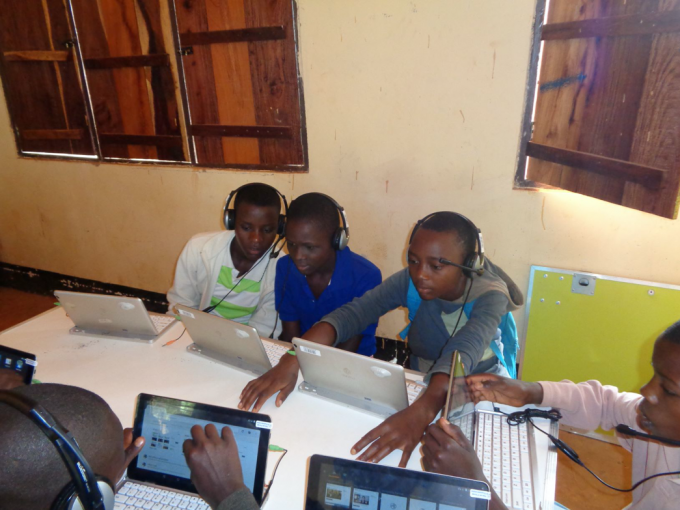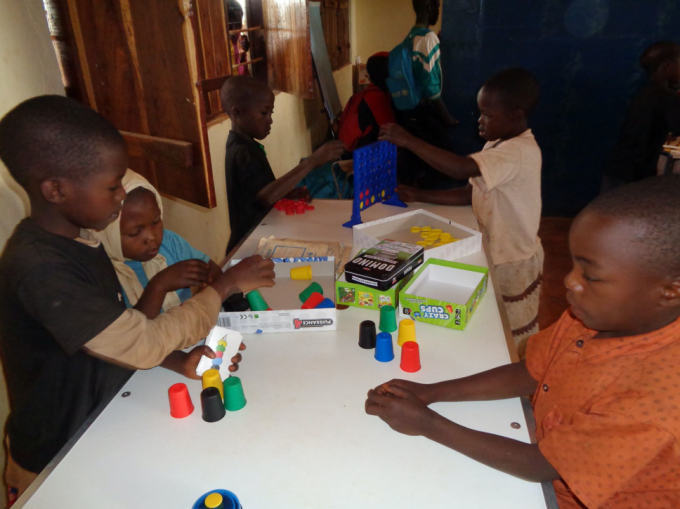Ideas Box - Bridging the Digital Divide in Refugee Camps

Being forced to flee your country for various security reasons comes with numerous challenges that can lead to you missing out on basic necessities. The challenges are significant and frequently long-lasting and can affect multiple aspects of human life. One important aspect of life that asylum can have a greater impact on is access to education. . Children in the camps are also left behind in various matters, including online or digital education, which deprives them of equal opportunities with non-refugee peers.
Ms Ntiharirizwa Evangeline, 35, arrived in Nduta camp, a famous camp for sheltering refugees from Burundi in Kibondo district- Kigoma region in Tanzania. Like other refugees, the mother of three children fled her country for fear of her safety. Along with her husband, Ms Evangeline believed that there were things she would never see in her life after fleeing her country.
When she was in Burundi, she thought her children would get better education, but when she found herself running away from the place she had called home for years, she knew her children would not know much about their native country and the changing world.
"The camp is a big but enclosed and protected area. You can't go out or do big business that will allow you to give your children a better education," she explains.
“When we came here in 2016, there was a big challenge for our children to get basic education that would give us hope, we knew that obviously they would be left behind. However, we encouraged ourselves because at least now we were sure of our children’s safety,” she adds.
Ms Evangeline was not the only Burundian worried about the future of her children's education and development after fleeing her country, but even some teachers in these camps were concerned about being left behind academically.
For Leonce Nitegeka, headmaster of Juhudi Primary School in the camp, a school under Save the Children, access to the internet to prepare lessons was a major problem. Teachers were forced to use only available physical materials and it was very difficult for students to understand actual things, thus many of the students lacked motivation to continue with school.
“The methods we used in teaching did not make the student want to attend classes with many dropping out of school and it was difficult for parents to persuade them to return. In short, there was nothing to attract them to school anymore,” explains Nitegeka.
The Ideas Box that is now changing tides

CAPTION: Children from the refugee community playing various creative games inside the Ideas Box building. The presence of this building has inspired many children to love school and relieve stress.
Mr Nitegeka now shares his gratitude to Save the Children for the new innovation of setting up the Ideas Box in the camp, a move that has stimulated student attendance at the school and also facilitated modern learning.
He says it has now become easier for teachers to design lessons in a modern way that does not differentiate them from teachers in Burundi or outside the camp.
"First and foremost we use this Ideas Box to create teaching tools as well as bring students here to watch a variety of videos after having been taught theoretically in the classroom," he explains.
For example, he says that if they have taught students about the Sahara Desert in theory, the former understand more when they are brought to the Ideas box facility where they watch the realities of the desert through video.
"We are also currently bringing our students here to learn a variety of sports including how to make a range of things like a house, a car and many more," says Nitegeka.
He says before the innovations arrived at the camp, teachers were unaware of using computers. This, however, he says has remained a thing of the past because now through the Ideas Box they are now able use computers and tablets, items they had never seen before.
“In fact, I can say that we are seeing great benefits through these innovations. At the moment children are very happy because of this Ideas box. Many of them who are psychologically affected have also been helped by this innovation as they leave here with no stress," he reveals.
"We urge Save the Children to continue to improve this project because it will help us a lot and will make every child in the camp to be more interested with education, it will be great to have more of these in every other schools in the camp," says the teacher.
The main goal of the ideas box project, funded by the ProFuturo Foundation and dubbed; Digital education and resilience building of vulnerable children in refugee camps is among other things to improve the quality of education and combat school drop-out rates. This partnership aims to further improve the quality of education for 6,293 Burundian and Congolese refugee children aged 6 to 17 and strengthen the resilience of refugee children through psychosocial support and the involvement of teachers, parents and the entire community.
“The initiative brings together Save the Children’s experience in refugee camps and ProFuturo’s track record in teacher training and the provision of educational resources and technological equipment,” says Joseph Mapunda, Save the Children’s Education Officer.
Manirakiza Jean is a facilitator at the Ideas Box facility, says besides children and teachers, community members also benefit. "I normally witness various community members who come to learn about what is happening in their native country and the world at large. They are always enjoying it," he says.
He says that due to the parents attending the facility, many of them want their children to stay at the facility after school so that they can continue to enjoy various sports activities. The use of tablet computers and mobile networks are bringing the latest in online education to students in the camp, and it is firing up their interest in learning.
“There are times when children are crowded, some playing various games and others watching educational videos as well as social interactions. This facility has brought great comfort to us as refugee community.”
Ms Ntiharirizwa Evangeline says she spends a part of her time at the facility as the availability of the equipment internet also helps her improve her facilitation methods as well as allowing her to learn entrepreneurship skills to enable her raise her income outside her facilitation role.
“I come here regularly and I have really learned a lot about parental care. I always want my children to be here as these are the things I always yearned for and I am very grateful to Save the Children,” she explains.
 Tanzania
Tanzania